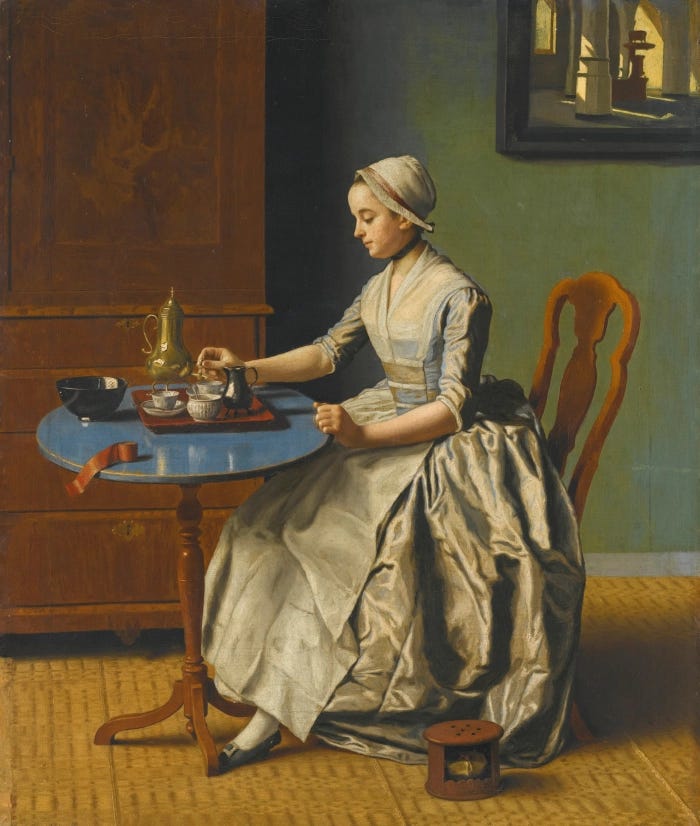A Dutch Girl at Breakfast by Jean-Etienne Liotard
I’m back with a new set of recommendations, an excellent way for me to ignore all the other writing and reading that has collected in pointed little piles on my desk. (Here’s the first set of recommendations, if you want to take a look.) I’ve also added in the paywall here, as I mentioned I would in my initial post about these recommendations. If you would like to keep reading but are experiencing financial hardship please let me know and I’ll open it up for you.
Remember, if you want to join the list, provide the titles of three books you could not live without and three adjectives, phrases, or ideas that you’re hoping to get a feel for in your recommended books. You can either leave a comment on this entry or hit reply to the email.
For our second entry of the series, Lisa R. sent in the following…
Books Lisa R. could not live without:
The Goldfinch by Donna Tart
The Covenant of Water by Abraham Verghese
The Crimson Petal and the White by Michel Faber
What Lisa R. is looking for in her next book:
short indie reads
literary fiction
quotidian — She says, “Love the domestic. I'd love a (much shorter) female Knausgaard experience.”
She also mentioned three recent books she’d particularly enjoyed: The Shame by Makenna Goodman, Dear Edna Sloane by Amy Shearn, Sandwich by Catherine Newman.
Recommendation 1
We the Drowned by Carsten Jensen
All three of Lisa’s all-time reads are doorstoppers, so I combed back through my reading lists to find something hefty and worth it. Enter We, the Drowned, a nearly 700-page Danish swashbuckler’s tale that I fondly remember devouring over a period of two weeks. Set on the island of Ærø, way out in the west of Denmark, it charts a course from the nineteenth-century through World War II; along the way there are miracles, cowards, wars, survival, and a shrunken head. And, intriguingly, the entire thing is told in the first-person plural, an omniscient “we” that speaks for the island and its inhabitants. Think if it as a Danish Moby Dick. Minus all that blubber.
Recommendation 2
Indelicacy is sparse, like a large airy room decorated with a few beautiful objects. It’s also lean, at just 160 pages. But packed into that minimal frame is an ambitious piece of writing that tries to pin down the relationships between idleness and work, ease and hardship. A cleaning woman at a grand museum wants to write, to use her mind for more than vacancy. So when she marries a rich museum-goer she assumes that her plans will now fall into place. Except time is not so easily controlled, and the woman, eventually employing another woman to clean up after her, struggles to use it to her advantage, falling into the age-old trap of the rich and idle. Indelicacy is concentrated, intense, and beaming, like a supernova just before it explodes.
Keep reading with a 7-day free trial
Subscribe to Unibrow to keep reading this post and get 7 days of free access to the full post archives.




